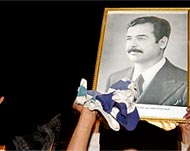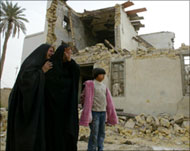Questions surround new Iraq TV
A new Arabic-language TV channel owned by an Egyptian tycoon is to begin airing this summer in Iraq.

But the channel, which hopes to catch the attention of Iraqi viewers and the pockets of local advertisers, is not without its detractors who question its role and credibility.
Hawa – Arabic for air – is set to launch in Baghdad on 15 June, two weeks before the US-led forces hand power over to the Iraqi Governing Council.
“Our broadcast will be terrestrial only for about six months and then we will decide if we will go on satellite,” says Muhammad Juhar, chairman of Video Cairo Sat, an Egyptian TV production company that will run the station.
Hawa will start with around six hours of news, news-related programmes, and cultural and interactive programmes before going 24/7 says Hasan Abu al-Ela, the station’s deputy manager and editor-in-chief.
Egyptian funding
The station is owned by Najib Sawiris, who also owns several telecommunications companies including regional mobile operator Orascom Telecom that operates in Iraq through its mobile phone service, Iraqna.
Hawa’s starting budget will be $25 million, Juhar, who is also the station’s executive manager, added.
 |
|
Saddam Hussein kept a tight rein |
Privately owned media was banned in Iraq under President Saddam Hussein, whose government also banned ordinary Iraqis from owning satellite dishes.
Before the US-led invasion in March 2003, Iraqis’ only news source, apart from heavily state-controlled media, was foreign radio stations such as the BBC and Monte Carlo. After Saddam’s fall a month later, they tuned to Pan-Arab and international TV channels for news.
Juhar said that negotiations with the occupation’s civil authority and the Iraqi Governing Council to obtain the station’s licence took more than four months.
“The Iraqis were weary to grant such permission to a foreign company, and the Americans were worried about our independence,” he said. “But with the veteran journalists we have, we convinced them that we are objective and not taking a line against anybody.”
Credibility question
But the fact that Hawa got its broadcast licence from the US-led occupying authority was enough to draw criticism even before the station went on air.
“If Sawiris had any political awareness, he would have never done this,” Hasan Nafaa, head of political science at Cairo University, said. “The American ruler has the final say in all matters in Iraq, including media, and this is enough to affect the credibility of the station.”
|
“It will be interesting to see Hawa operate freely with the Americans controlling everything” Jalaa Jad Allah, |
He added that cooperating with the Americans in Iraq further “instates the authority of occupation”.
Despite promoting free speech and lifting the ban on privately owned media in Iraq, coalition authorities have closed down the Baghdad newspaper al-Hawza for 60 days. It accused its publishers, followers of the Shia leader Muqtada Al-Sadr, of inciting violence against occupation troops.
According to a BBC report, another newspaper, al-Mustaqilla, was shut down for the same reason.
“It will be interesting to see Hawa operate freely with the Americans controlling everything,” Jalaa Jad Allah, an editor at Egypt’s state-owned al-Jumhuriya newspaper, said.
But Abu al-Ela, a former BBC Arabic service senior executive and a longtime broadcaster, insisted the new station has no political agenda, pledging an “objective editorial policy as we are not with or against anybody”.
Structure
Hawa will rely on four bureaus across Iraq for news gathering, along with two regional offices in Cairo and Jerusalem, and an office in Washington DC. It will employ some 240 people in Baghdad.
According to Juhar, the Iraq-based bureaus will rely heavily on local experience but will also employ other Arab nationalities.
 |
|
Iraqis have more pressing issues |
He said that workers will have the right to own shares in the station.
Apart from news, the channel will feature culture and entertainment programmes.
“Iraqi people need family-type programmes, and programmes to tell them about their country’s history,” Juhar said.
But Hanzada Fikry, journalism and broadcasting professor at the American University in Cairo, believes that reporting from “a war zone” will dictate the channel’s daily schedule.
“How far can you go with entertainment with people who are barely making ends meet?” she asked. “The Iraqis need to eat, and send their kids to school. They need to know what’s going wrong in their country.”
Business objectives
According to Juhar, one of Hawa’s main objectives is to make money out of advertising. He said that the station has already secured Iraqna as an advertiser to start with.
To reach such ends, Usama Jamal, a Lebanese marketing expert, argues that the channel should remain terrestrial.
“Many local advertisers and Iraq-based franchises of international brands will be interested in advertising on Hawa,” Jamal, manager of the Egypt office of Starcom Media House, said.
“But once they will move on to satellite, the costs will be high and it will be very difficult for them to attract advertisers because of the fierce competition among some 150 channels already there.”